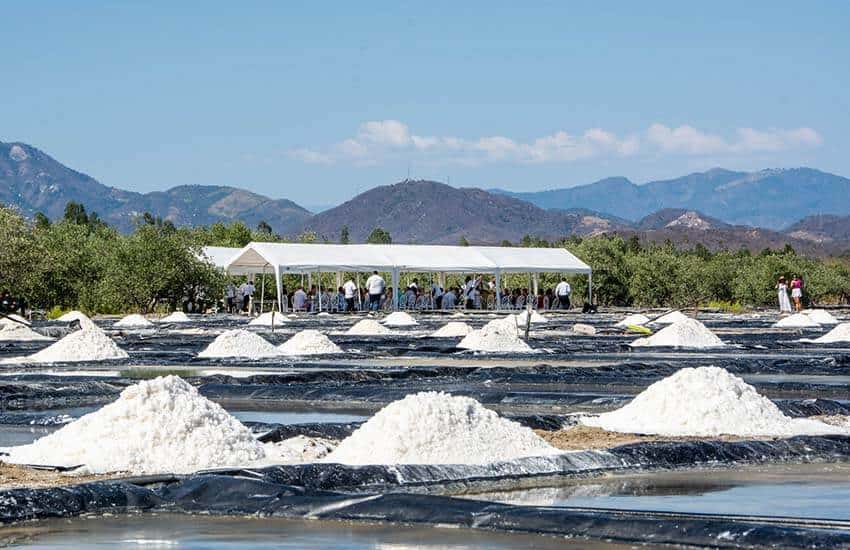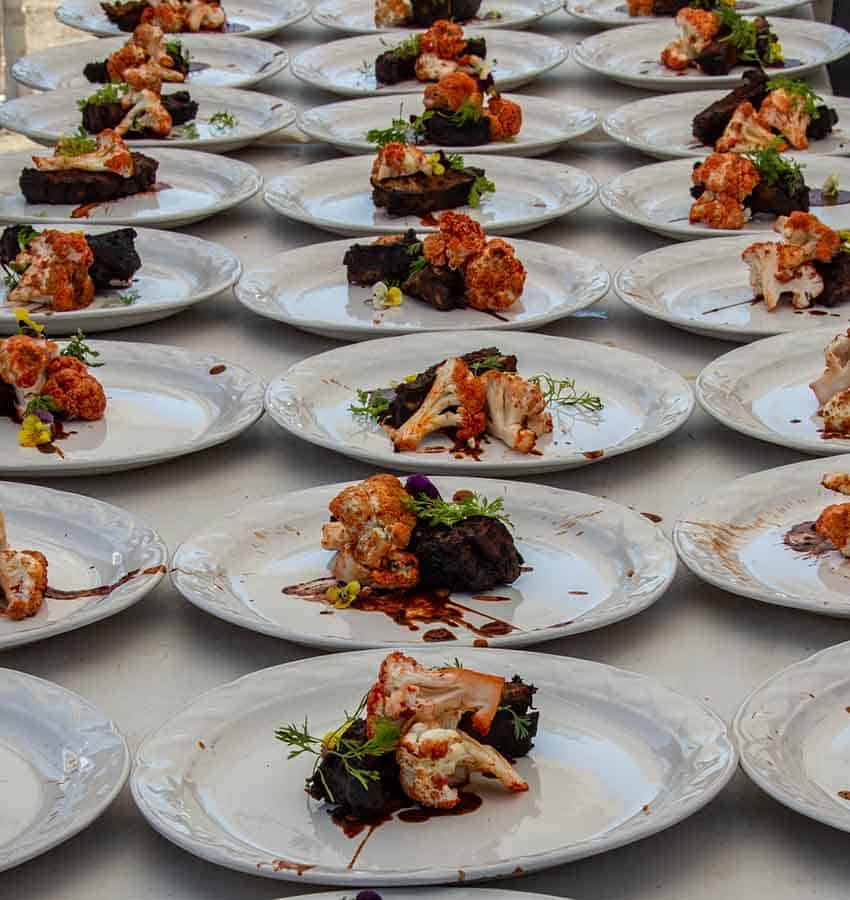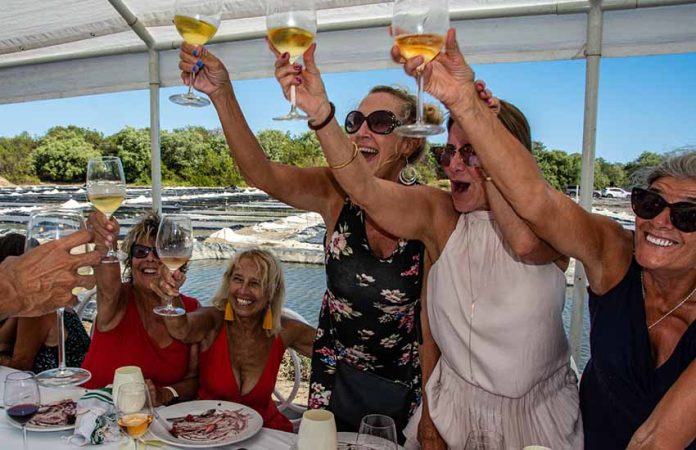In Salinas de Potosi, Guerrero, located between the town of San Jeronoimito and Barra de Potosi, there is an almost mystical stretch of land known as the saltwater lagoons.
There, many landowners work their fincas (farms) to produce some of the finest salt in the state, known as the Sal de Potosi.
It was also the site of an adventurous and completely unexpected clandestine dinner that took place on March 6, hosted once again by Antonio Meneses and his wife, Chef Nuria Meneses, of Tanta Vida Restaurant in Ixtapa as well as Antonio’s brother, Chef Felipe Meneses of Angustina and Los Narvales restaurants in Zihuatanejo.
The hosts’ regular “pop-up” dining experience in Guerrero is called Clandestina: it’s a roving gourmet meal cooked by a few different fine chefs and served in a different location each time. As with all Clandestina dinners the Meneses family have hosted in pre-COVID years, part of the appeal is that guests have no idea where they will end up until they get there.
This year, 60 guests paid 2,500 pesos per person to meet at Los Narvales restaurant, where they were treated to an ice-cold drink before boarding two buses for a 45-minute ride to their surprise location.

Along the way, several guests made bets as to where we were headed, but as we passed one possible location after the other, everyone ran out of ideas.
About 30 minutes in, we turned south off Highway 200 onto a dirt road. I remarked to everyone that this was the way to the salt fields, a place I had visited on my scooter with a friend a year ago — a wasteland of sea mounds, if memory served. I could not imagine that this would be our destination, based on some of Clandestina’s previous exotic locations.
I was wrong.
As we straggled out of the luxury charter bus into the searingly hot, desert-like landscape, I think we were uniformly stunned. The completely flat fields, dotted with what seemed like mounds of pure white salt, stretched before us as far as the eye could see.
You’ve got to be kidding me.
Just as it seemed that many wanted to turn and run, several guides greeted us hospitably and took us to a path ahead, where we could see an enormous white tent in the distance that shimmered invitingly in the sun.

As we trudged through the hard-packed mud between the rows of ponds — which I later learned are to contain water directly in the sun, thus providing salt more quickly than normal — I could feel the attitude around me change from dismay to excitement.
The long table that stretched beneath the canopy when we arrived at our destination was decorated just how I would imagine it if you were in a desert oasis. Soon, everyone was chatting and laughing and enjoying themselves as the overly attentive small army of waiters poured wine and water. The food was outstanding, with all four courses presented by each chef who created it.
As an appetizer, we began with Amuse-bouche, which was a Zihua oyster, apple, and kiwi vinaigrette with citrus foam and tantarria salt. (It was so delicious, I slurped down two).
The first course, presented by Chef Felipe, consisted of mahi-mahi, macerated in herbs, with a Rubik’s cube of vegetables, salted mangrove leaves — off which we were invited to lick the salt, and mango and fruit passion sauce. The accompanying wine, a crisp, white Chenin, flowed freely.
Our second course — pumpkin pie from the garden of Casa Bettina, an organic vegetable salad, anchovy butter and basil pesto — was presented by guest chef Christian Plumail. This tasted even better than it looked, if that was possible. The wine was a pinot grigio from Italy and paired perfectly with the dish.
By now, people were feeling quite festive, and the chatter up and down the long table became even more animated as the wine continued to pour. Luckily, we were all securely seated under shade as the sun was particularly hot that day, but a warm nonstop breeze kept us all comfortable despite that.
Chef Javier Cerillo of the well-regarded Thompson Hotel in Zihuatanejo presented our course, which consisted of a single pork rib hung on the coals, along with roasted cauliflower and marinade. Delicious, it was paired with three different Italian red wines.
Dessert was chocolate cake with amaretto with a reduction of red wine, frozen yogurt and, of course, the local salt. Chef José Luis Saldana Pérez presented this final course, and as the other chefs did, he explained how he made his concoction. The wine was a lovely Brut from Querétaro.
One of the meal’s highlights was a salt miner, Michael Betancourt, who doubled as a waiter, gave a talk about the salt fields. Betancourt explained that there were many families who harvested their own fincas but that his family had been doing so for four generations. Salt continues to be the base of the economy in the towns mentioned above, where it supports large families.
The salt [harvesting] process is somewhat extensive and difficult to explain, Betancourt said. “It is more by intuition and knowledge than by following rules, but broadly speaking, it begins by extracting saltwater from a water well and then putting it in a nylon tub that will boil it in the sun to separate the water from the salt so it can be packed and sold.”
When asked how the families get their salt to market, Betancourt explained that although they sell the salt through cooperatives, his father has sold to the same customers for many years. The international market and the opportunity to export, he says, is something he is hoping to explore and expand into in the future.
After several enjoyable hours, the happy, well-fed and perhaps somewhat tipsy guests headed back to the waiting buses to return to their starting location in Zihuatanejo. Already several people were asking when the next Clandestina would happen — April 10, as it turns out.
If you’re interested, I recommend you hurry and buy tickets. If the success of this one is any indication, they won’t last long.
The writer divides her time between Canada and Zihuatanejo.
